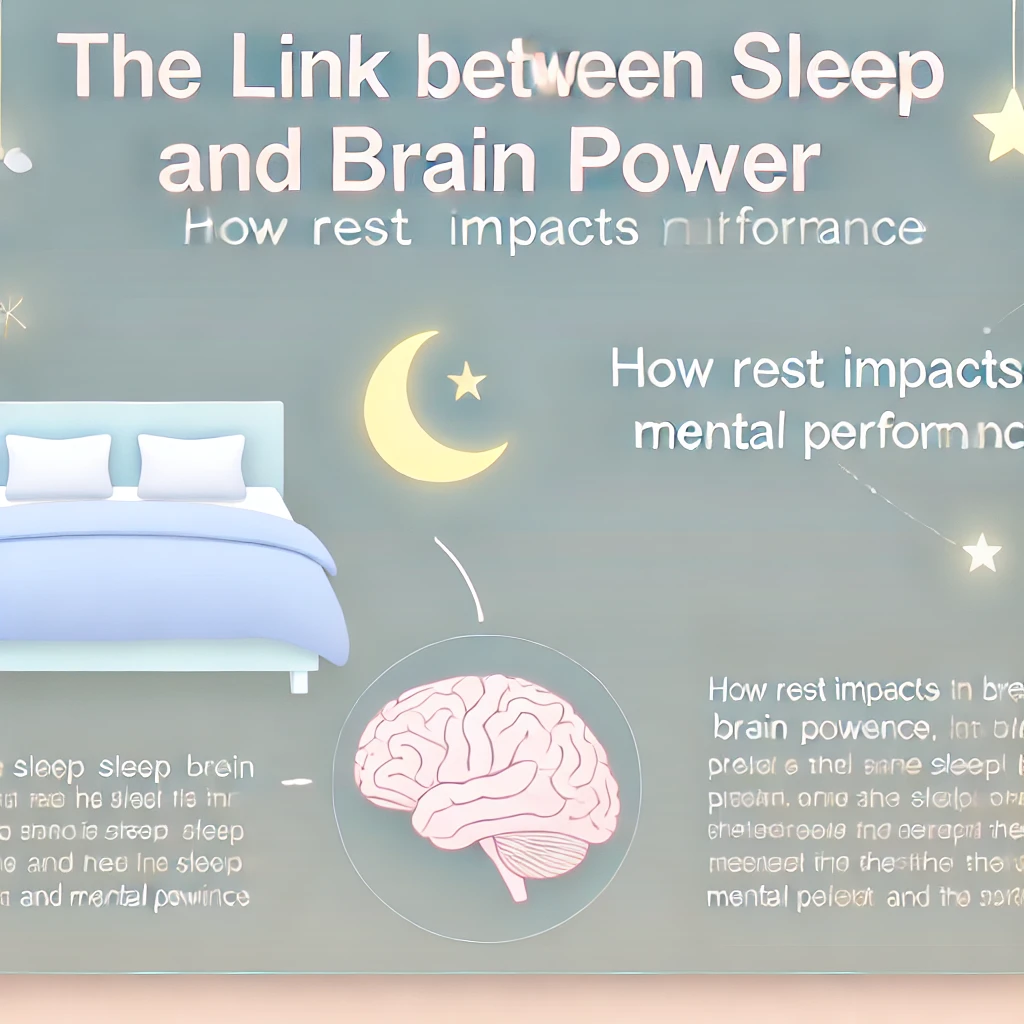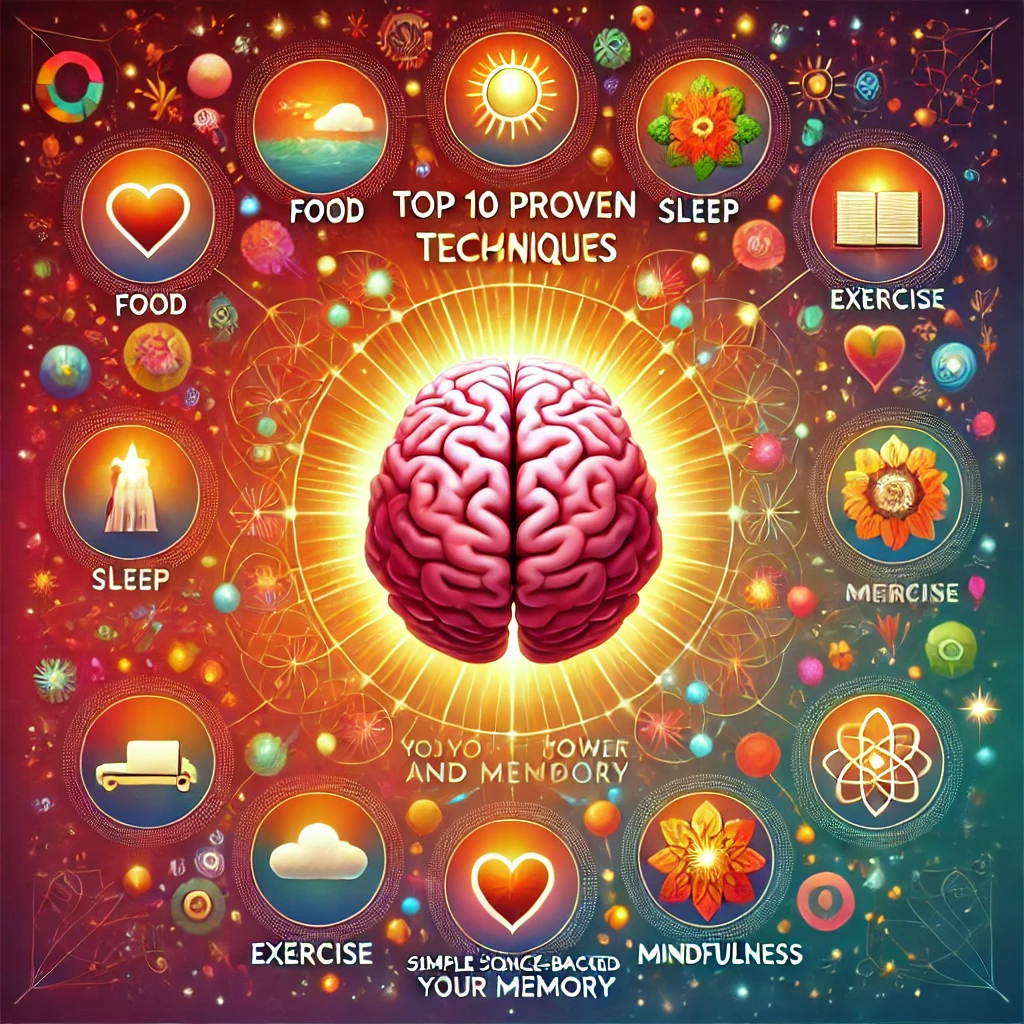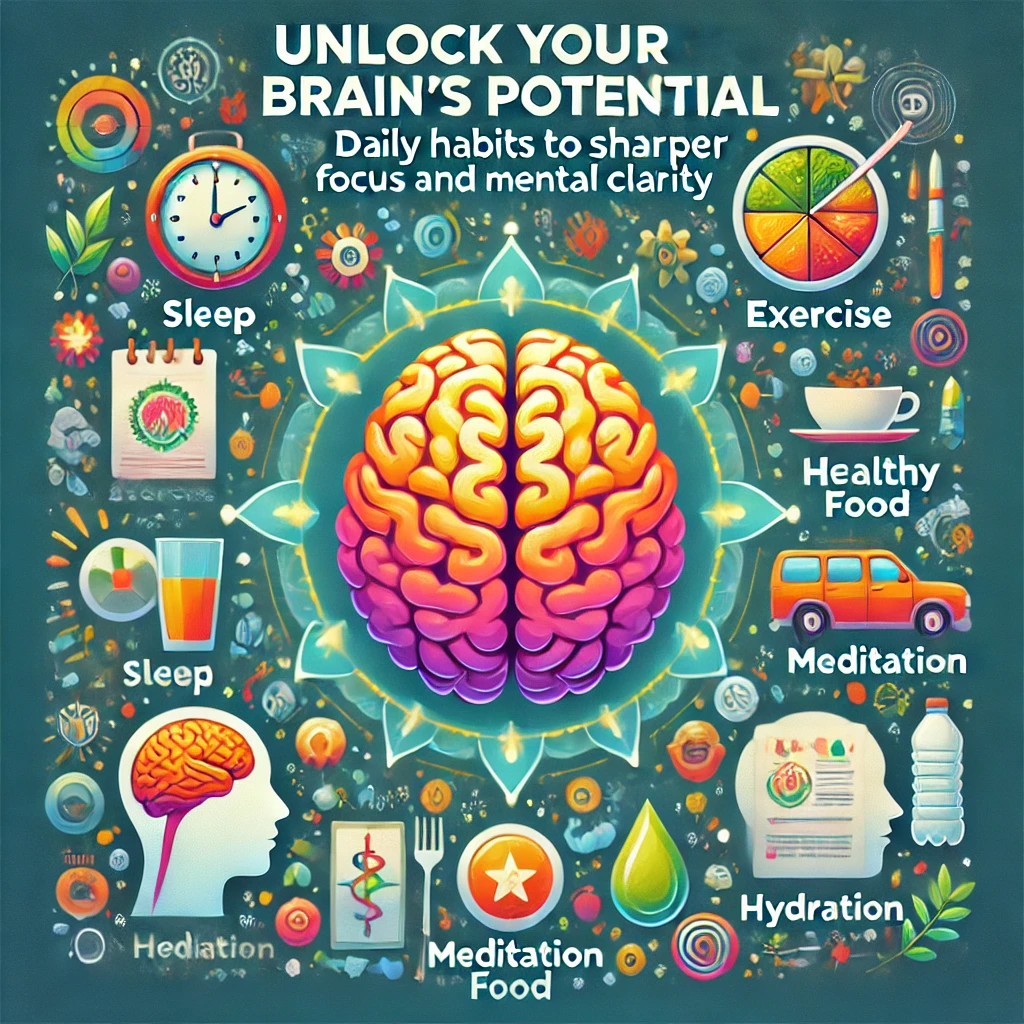Introduction
We’ve all been there—pulling an all-nighter or staying up way past our usual bedtime, only to wake up feeling foggy and struggling to focus the next day. But it’s not just in our heads: the relationship between sleep and brain power is well-documented. Quality sleep is crucial for brain health and mental performance, influencing everything from memory and focus to mood and decision-making.
In this article, we’ll dive into the science of how sleep affects focus and memory, exploring ways to improve cognitive function through sleep. With practical tips for better rest and insights on the impact of sleep on mental performance, you’ll gain tools to boost brain function naturally by prioritizing sleep.
1. Why Sleep is Essential for Brain Health
Sleep is much more than just “downtime” for the brain. During sleep, our brains enter a state of repair and renewal, processing information from the day and clearing out toxins that accumulate during waking hours. Studies have shown that sleep plays a critical role in consolidating memories, regulating emotions, and even creating new neural connections.
The science of sleep and brain power:
- During sleep, cerebrospinal fluid flushes out waste products from the brain, a process that keeps neurons functioning efficiently.
- Sleep stages, especially REM and deep sleep, play vital roles in different aspects of brain health, including memory and problem-solving.
- Lack of sleep is associated with an increase in amyloid-beta proteins, which are linked to neurodegenerative diseases.
Relatable anecdote:
I used to skimp on sleep during college, thinking I could “catch up” on weekends. But after consistently getting better rest, I noticed my memory improved, and I felt more alert. Now, I prioritize sleep as an essential part of my routine, especially when I need to be at my mental best.
2. How Sleep Affects Focus and Memory
One of the most immediate impacts of poor sleep is on our ability to focus and remember information. When we’re sleep-deprived, our brains struggle to consolidate new memories, making it harder to recall facts, events, or even simple details.
Sleep and cognitive performance:
- Focus and Attention: Poor sleep affects the brain’s ability to filter out irrelevant information, making it harder to stay focused on tasks.
- Memory Formation: Deep sleep stages, especially REM, are critical for processing memories and transferring them to long-term storage.
- Learning and Retention: Lack of sleep interferes with the brain’s capacity to absorb and retain new information, which is why getting a good night’s sleep before an exam or big presentation is key.
Example:
I used to think studying late into the night before an exam would help me learn more, but I often forgot much of what I’d crammed. After switching to a schedule where I studied earlier and got quality sleep, my retention improved significantly.
3. Boost Brain Function Through Sleep: The Power of REM and Deep Sleep
Not all sleep stages are created equal. REM (Rapid Eye Movement) and deep sleep each play unique roles in brain health. REM sleep is essential for creative problem-solving and emotional processing, while deep sleep is crucial for physical and mental restoration.
The importance of REM and deep sleep for mental clarity:
- REM Sleep: During REM, the brain processes emotions, reduces stress, and supports creativity and problem-solving.
- Deep Sleep: Also known as slow-wave sleep, deep sleep allows for cell repair, immune function, and hormone balance, all of which are essential for long-term brain health.
- Sleep Cycles: Most people go through 4-5 sleep cycles per night, with each cycle consisting of light sleep, deep sleep, and REM. Quality sleep allows for the natural progression through these cycles, which supports optimal brain function.
Relatable anecdote:
After learning about the importance of REM and deep sleep, I started tracking my sleep patterns. On nights when I got more REM and deep sleep, I noticed I felt more refreshed and mentally sharp the next day. It was a game-changer for my productivity!
4. Sleep Habits for Better Mental Performance
Building healthy sleep habits can help ensure that you’re getting the restorative sleep your brain needs. Consistency is key, as it allows your body to establish a natural rhythm, which can improve both the quality and quantity of sleep.
Tips for creating a brain-boosting sleep routine:
- Set a Consistent Bedtime: Going to bed and waking up at the same time every day, even on weekends, helps regulate your internal clock.
- Create a Wind-Down Routine: Engaging in calming activities, like reading, meditating, or stretching, signals to your brain that it’s time to wind down.
- Limit Screen Time: The blue light from screens can interfere with melatonin production, making it harder to fall asleep. Aim to avoid screens at least an hour before bed.
Example:
I used to scroll through my phone in bed, but it often left me feeling wide awake. Once I switched to reading or journaling, I fell asleep faster and had a more restful night. This simple change made a big difference in my focus the next day.
5. Mindfulness and Relaxation Techniques to Improve Sleep Quality
Mindfulness and relaxation exercises can significantly impact sleep quality by reducing stress and promoting relaxation. Practicing mindfulness before bed can help “quiet” the mind, making it easier to fall asleep and stay asleep.
Mindfulness techniques for better sleep:
- Deep Breathing Exercises: Deep breathing slows the heart rate and relaxes the nervous system, preparing your body for sleep.
- Body Scan Meditation: Mentally scanning your body from head to toe can help release physical tension and calm the mind.
- Guided Imagery: Imagining peaceful scenes, like a beach or forest, can redirect your focus and ease anxiety, promoting deeper sleep.
Relatable anecdote:
After a stressful day, I used to toss and turn in bed. But I found that doing a quick body scan meditation helped me relax, allowing me to drift off more easily and wake up feeling refreshed. Adding these mindfulness exercises to my routine has improved both my sleep and my mental performance.
6. Nutrition and Sleep: Fueling Your Brain for Better Rest
What you eat can also impact your sleep quality and, in turn, your brain power. Certain nutrients support sleep by regulating melatonin production, relaxing muscles, and stabilizing blood sugar levels throughout the night.
Brain-friendly foods that support sleep:
- Magnesium-Rich Foods: Magnesium, found in leafy greens, almonds, and bananas, can help relax muscles and promote restful sleep.
- Melatonin-Boosting Foods: Foods like cherries, grapes, and tomatoes contain melatonin, a hormone that regulates sleep cycles.
- Complex Carbohydrates: A small snack with complex carbs, like whole-grain crackers, can help stabilize blood sugar and prevent nighttime wakefulness.
Example:
I used to eat a big meal right before bed, but it often left me feeling uncomfortable and disrupted my sleep. Now, I opt for a light snack like a banana with almond butter, which seems to help me fall asleep faster and wake up feeling more rested.
7. The Importance of Rest for Mental Clarity and Emotional Well-being
Sleep doesn’t just affect your cognitive performance; it also impacts your emotional regulation and mental resilience. Poor sleep is linked to mood swings, irritability, and a greater sensitivity to stress, all of which can undermine focus and productivity.
The role of sleep in emotional well-being:
- Quality sleep helps regulate mood, making it easier to manage stress and stay focused during the day.
- Chronic sleep deprivation is associated with higher risks of anxiety and depression, both of which can affect brain health.
- Restorative sleep promotes emotional resilience, allowing you to bounce back from challenges more easily.
Relatable anecdote:
I noticed that on days after a poor night’s sleep, even minor inconveniences would stress me out. Once I started getting consistent quality sleep, I found I was able to handle stress better and felt more emotionally balanced.
8. How to Improve Cognitive Function with Sleep
Getting enough quality sleep is one of the simplest ways to improve cognitive function naturally. Prioritizing sleep not only boosts brain power but also supports long-term cognitive health by reducing the risk of neurodegenerative diseases.
Steps to improve cognitive function with sleep:
- Aim for 7-9 Hours of Sleep: This range is ideal for most adults and allows the brain to fully restore and recharge.
- Optimize Your Sleep Environment: Keep your bedroom cool, dark, and quiet. Consider blackout curtains, white noise machines, or earplugs for optimal conditions.
- Avoid Stimulants Late in the Day: Caffeine and nicotine can stay in your system for hours, so avoid them at least six hours before bedtime.
Example:
I used to drink coffee in the late afternoon to power through work, but it often kept me up at night. Once I switched to decaf in the afternoon, my sleep improved, and so did my mental clarity and focus the next day.
Conclusion
Sleep is one of the most powerful tools for boosting brain power and mental performance. By understanding the link between sleep and brain health, we can take simple steps to improve our cognitive function, focus, and memory. From establishing a calming bedtime routine to practicing mindfulness exercises, small changes can make a significant difference.
Remember, quality sleep isn’t a luxury—it’s a necessity for a healthy, resilient mind. Prioritize your rest, and you’ll likely notice improvements in everything from productivity to emotional well-being. The journey to a sharper, more focused mind begins with one night of great sleep.
FAQ Section
1. How does sleep impact brain power?
Sleep is essential for processing memories, clearing out toxins, and supporting overall brain function, making it a cornerstone of mental performance.
2. Can lack of sleep affect focus and memory?
Yes, lack of sleep impairs focus, attention, and memory consolidation, making it harder to retain new information and recall details.
3. How much sleep do I need for optimal brain function?
Most adults benefit from 7-9 hours of sleep per night, although individual needs can vary.
4. What foods help improve sleep quality?
Foods rich in magnesium, melatonin, and complex carbs—like leafy greens, cherries, and whole grains—can support restful sleep.
5. How does deep sleep contribute to brain health?
Deep sleep allows the brain to clear out waste products, repair cells, and support immune function, which is vital for cognitive health.
6. What is the role of REM sleep in mental clarity?
REM sleep plays a critical role in processing emotions and memories, supporting problem-solving and mental clarity.
7. Can mindfulness help improve sleep quality?
Yes, mindfulness practices like deep breathing, body scans, and guided imagery can reduce stress and promote restful sleep.
8. How does sleep impact emotional well-being?
Quality sleep supports emotional regulation, making it easier to manage stress and maintain a positive mood.
9. How can I optimize my sleep environment for better rest?
Keep your bedroom cool, dark, and quiet. Use blackout curtains, white noise machines, or earplugs to create an ideal sleep environment.



